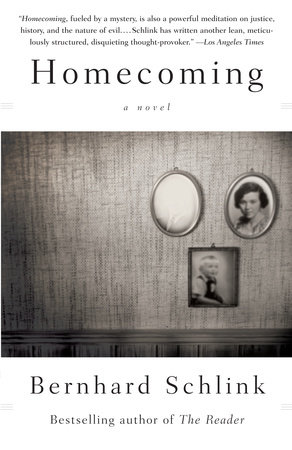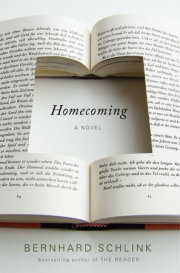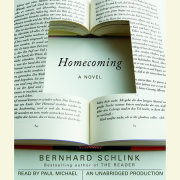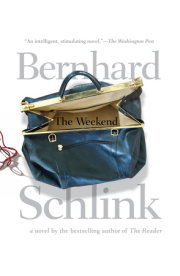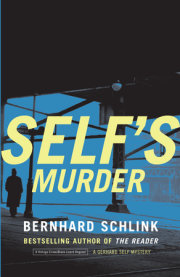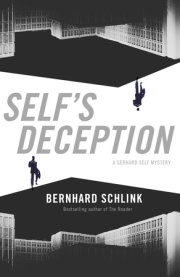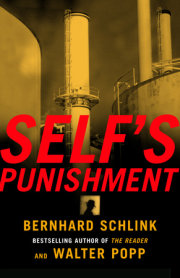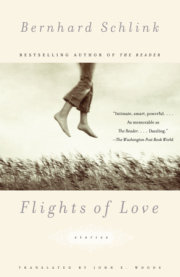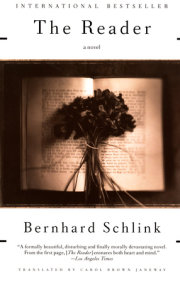Chapter 1When I was young, I spent the summer holidays with my grandparents in Switzerland. My mother would take me to the station and put me on the train, and when I was lucky I could stay put and arrive six hours later at the platform where Grandfather would be waiting for me. When I was less lucky, I had to change trains at the border. Once I took the wrong train and sat there in tears until a friendly conductor dried them and after a few stations put me on another train, entrusting me to another conductor, who then in similar fashion passed me on to the next, so that I was transported to my goal by a whole relay of conductors.I enjoyed those train trips: the vistas of passing towns and landscapes, the security of the compartment, the independence. I had ticket and passport, food and reading; I needed no one and had no one telling me what to do. In the Swiss trains I missed the compartments, but then every seat was either a window or aisle seat and I didn’t need to fear being squeezed between two people. Besides, the bright wood of the Swiss seats was smarter than the red-brown German plastic, just as the gray of the coaches, the trilingual inscription “SBB—CFF—FFS,” and the coat of arms with the white cross in the red field were nobler than the dirty green with the inscription “DB.” I was proud to be half Swiss even though I was more at home with both the shabbiness of the German trains and the shabbiness of the city my mother and I lived in and the people we lived with.The station of the city on the lake, the goal of my journey, was the end of the line. The moment I set foot on the platform I couldn’t miss Grandfather: he was a tall, powerful man with dark eyes, a bushy white mustache, and a bald pate, wearing an off-white linen jacket and straw hat and carrying a walking stick. He radiated reliability. I thought of him as tall even after I outgrew him and powerful even after he had to lean on the walking stick. As late as my student days he would occasionally take my hand during our walks. It made me uncomfortable but did not embarrass me.My grandparents lived a few towns away on the lake, and when the weather was fine Grandfather and I would take the boat there rather than the train. The boat I liked best was the big old paddle-steamer, the one that let you see the engine’s glistening oil-coated bronze-and-steel rods and cages in the middle at work. It had many decks, covered and uncovered. We would stand on the open foredeck, breathe the wind in, and watch the small towns appear and disappear, the gulls circle the ship, the sailboats flaunt their billowing sails, and the water-skiers perform their tricks. Sometimes we could make out the Alps behind the hills, and Grandfather would identify the peaks by name. Each time I found it a miracle that the path of light cast by the sun on the water, glistening serenely in the middle and shattering into prancing slivers on the edges, followed along with the boat. I am sure that early on Grandfather laid out the optical explanation for it, but even today I think of it as a miracle. The path of light begins wherever I happen to be.
Chapter 2In the summer of my eighth year my mother had no money for a ticket. She found a long-distance truck driver—I have no idea how—to take me to the border and hand me over to another driver, who would drop me off at my grandparents’ house.We were to meet at the freight depot. My mother was busy and could not stay. She deposited me and my suitcase at the entrance and ordered me not to budge from the spot. I stood there anxiously watching each passing truck, relieved and discouraged in turn as they passed. They were bigger and made more of a roar and stink than I had realized: they were monsters.I don’t know how long I waited. I was too young to have a watch. After a while I perched on my suitcase and jumped up whenever a truck seemed to slow down and want to stop. Finally one did stop. The driver hoisted me and the suitcase into the cabin, and his mate placed me in the bed behind the seat. They told me to keep my mouth shut and my head below the side of the bed and sleep. It was still light, but even after it got dark I couldn’t sleep. At first the driver or his mate would turn and curse me if my head stuck up above the bed; then they forgot about me, and I could look outside.My field of vision was narrow, but I was able to watch the sun go down through the passenger-seat window. I caught only fragments of the conversation between the driver and his mate: it had to do with the Americans and the French, deliveries and payments. I was almost lulled to sleep by the regularly recurring sound, the regular, restrained tremor of the truck as it passed over the large slabs forming the surface of the Autobahn in those days. But the Autobahn soon came to an end, and we drove over bad, hilly country roads, where the driver could not dodge the potholes and was constantly shifting gears. It was an uneasy journey through the night.The truck kept stopping: faces would appear in the side windows, the driver and his mate would climb in and out, let down the tailboard, shove the cargo around and restack it. Many of the stops were factories and warehouses with bright lights and loud voices; others were dark filling stations, rest areas, and open fields. The driver and his mate may well have combined their official duties with a bit of business on the side—smuggling or fencing—which lengthened their time on the road.In any case, by the time we reached the border the truck I was supposed to meet had left, and I spent the dawn hours in a town whose name I do not recall. The main square had a church, a new building or two, and many roofless buildings with empty windows. As it began to get light, people came to set up a market, hauling sacks, crates, and baskets on large, flat two-wheeled carts, to which they had hitched themselves between the shafts with loops over their shoulders. All night I had been afraid of the captain and his helmsman, of being attacked by pirates, of having to pee. Now I was afraid both of being picked up by someone who would do as he pleased with me and of going unnoticed, being left to my own devices.Just as the sun grew so warm that I began to feel uncomfortable on the fully exposed bench, from which I dared not stray, a car with an open top stopped at the side of the road. The driver remained in the car, but the woman beside him got out, put my suitcase in the trunk, and pointed to the backseat. Whether it was the large car, the fancy clothes the driver and his companion wore, the self-assured and nonchalant way they had of moving, or the fact that just over the Swiss border they bought me my very first ice cream—for a long time thereafter I pictured them whenever I heard or read about the rich. Were they smugglers or fences like the truck drivers? I found them equally creepy, though they were young and treated me with consideration, like a little brother, and delivered me to my grandparents in time for lunch.
Chapter 3The house my grandparents lived in had been built by a globetrotter of an architect: it had eaves supported by artfully hewn wooden struts, a formidable mezzanine bay window, a top-floor balcony adorned with gargoyles, and windows framed by round stone-in-stone arches—a combination colonial country seat, Spanish fortress, and Romanesque cloister. Yet it held together.The garden helped to make it a whole: there were two tall fir trees to the left of the house, a large apple tree to the right, a thick old box hedge in front, and wild vines climbing up the walls. The garden was spacious: there was a veritable meadow between the street and the house; there were vegetable beds, tomato and bean plants, raspberry, blackberry, and currant bushes, a compost pile to the right of the house, and, to the left, a wide gravel path leading to the rear entrance, which was framed by two hydrangea bushes. The gravel would crunch underfoot, and by the time Grandfather and I had reached the entrance Grandmother would have heard us coming and opened the door.The crunch of the gravel, the buzz of the bees, the scratch of the hoe or rake in the garden—since those summers at my grandparents’ these have been summer sounds; the bitter scent of the sun-drenched boxwood, the rank odor of the compost, summer smells; and the stillness of the early afternoon, when no child calls, no dog barks, no wind blows, summer stillness. The street where my mother and I lived was full of traffic. Whenever a tram or truck drove by, the windows rattled, and whenever the machines used to demolish and reconstruct the neighborhood buildings bombed during the war went into operation, the floors shook. There was little or no traffic where my grandparents lived, neither in front of the house nor in the nearby town. Whenever a horse and cart drove past, my grandfather would tell me to fetch a shovel and pail and we would coolly collect the dung for the compost pile.The town had a train station, a landing stage for boats, a few shops, and two or three restaurants, one of which served no alcohol, and my grandparents sometimes took me there for Sunday lunch. Every other day, Grandfather made the rounds of the dairy, the baker’s, and the cooperative grocer’s, with occasional side trips to the pharmacy or shoemaker’s. He wore his off-white linen jacket and a likewise off-white linen cap and carried a notebook in his pocket, one that Grandmother had made by sewing together bits and pieces of blank paper and that he used for shopping lists. He held his walking stick in one hand and my hand in the other. I carried the old leather shopping bag, which, since we made the rounds every other day, was never so full as to weigh me down.Did Grandfather take me shopping every other day just to make me happy? I loved going shopping: the smell of the Appenzeller and Gruyère in the dairy, the scent of the fresh bread in the bakery, the variety and quantity of food in the grocery. It was so much nicer than the small shop my mother sent me to because she could buy on credit there.After our shopping expedition we would walk to the lake, feed the swans and ducks with stale bread, and watch the boats sail past or take on and let off passengers. I felt the stillness here as well. The waves beating against the seawall—that too was a summer sound.
Copyright © 2008 by Bernhard Schlink. All rights reserved. No part of this excerpt may be reproduced or reprinted without permission in writing from the publisher.

